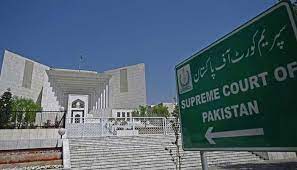Recently, two judges of the Supreme Court have expressed concerns and raised questions over the unlimited powers of the chief justice of Pakistan (CJP), and termed the court’s decision as a solitary action or a one-man show. According to the details, in a 27-page detailed ruling regarding the judgment in Pakistan Tehreek-e-Insaf’s (PTI) plea over the delay in Punjab and Khyber Pakhtunkhwa elections,
Justice Syed Mansoor Ali Shah and Justice Jamal Khan Mandokhail expressed the need to revisit the powers enjoyed by the office of the Chief Justice of Pakistan, Umar Ata Bandial. The judges of the apex court were of the view that the top court cannot be dependent on the solitary decision of the Chief Justice, but must be regulated through a rule-based system approved by all Judges of the Court under Article 191 of the Constitution, in all judicial matters of court’s jurisdiction under Article 184(3) including the exercise of suo motu jurisdiction, the constitution of Benches to hear such cases, the constitution of Regular Benches to hear all the other cases instituted in this Court along with the constitution of Special Benches, etc. The two adjudicators noted that in the persuasion of one-man policies, the apex court may become an autocratic and insulated institution that can surely go against the rights and interests of the people.
The decades-long corruption, nepotism, and absence of accountability coupled with a division on party lines/ political affiliation, likes, and dislikes have not only weakened all State institutions of Pakistan, but also led to decay, defamation, and bureaucratic strife in important institutions of the country. Meanwhile, an abundance of political cases, pressure from the ruling government and opposition, unnecessary media coverage during the hearings, and unessential remarks by the adjudicators not only create hype in the public but also put the worst effects on the discipline and performance of the top courts. Similarly, misuse of high offices by the previous judges, involvement in political and administrative matters, seeking public interest above the law/constitutions, disputed decisions, and media/ social media rating had badly tarnished the image of the judiciary and politicized the work of the adjudicators in the past.
Unfortunately, our nation has witnessed multiple obscene incidents in our judicial history ranging from the Supreme Court attack to Justice Qayum’s scandal, unceremonial arrest of the top adjudicator to the proudful lawyer’s movement and reinstatement of the judges, while regretful intimidation of the bench from the bar, slow delivery of justice and a persistent political interference in the top ranking institution. Although, successive Chief Justices vowed to resolve the issues relating to the judicial system but failed in delivering their promise during their term in office because massive investment is required for the constitution of new courts, recruitment of judges and lower staff, etc for eradication of corruption and speedy compensation of justice to the public.
As for inter-judge rivalry and the recent dissenting note of two judges is concerned, the apex court is not a political forum that works on a democratic line, and runs its routine administrative business through a poll or a bargaining system rather it is a constitutional body generally formed by a specific number of judges headed by the Chief Justice of Pakistan. Legally, the Chief Justice has sole authority to work in the best interest of its institution, the public, and the country in line with the provisions of the constitution. The judges may have differences over certain matters, which must be raised appropriately because it plays an accountability role and is essential for making home in order.
Realistically, unethical and irrational politics had ruined every institution in the country including the judiciary. The warring political groups had brought several political issues to the courts and now trying to influence the judiciary by persuasion, propaganda campaigns, and direct attack on the judiciary that creates distrust among the judges and undermined the judicial system in the country. The nation supports the judiciary and the top adjudicator and hopes for an impartial service of justice. At the same time, the descending judges must use official forums including the judicial commission to confirm/ validate their views and address their grievances so a healthy tradition of self-accountability moves forward amicably, and more transparency, merit, and openness could be brought to the judicial system of the country.







